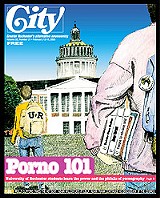[
{
"name": "500x250 Ad",
"insertPoint": "5",
"component": "15667920",
"parentWrapperClass": "",
"requiredCountToDisplay": "1"
}
]
Imagine being a high school senior interested in attending the University of Rochester (or a parent thereof), and receiving this piece of promotional material from the college...
"The University of Rochester is uniquely positioned to offer its students a world-class education in a learning environment at the forefront of such fields as science, medicine, and pornography. Scientists and students at UR's Laboratory for Laser Energetics conduct cutting-edge research in such areas as optics and nuclear fusion. Researchers and faculty at UR's newly expanded Medical Center make important discoveries in the fascinating new realm of biotechnology. Every year, the student-sponsored Cinema Group offers students exposure to some of the hottest X-rated films ever made, and the university library's DVD collection may soon contain a wide selection of pornographic titles, featuring veteran porn stars like Jenna Jameson and Ron Jeremy, and the latest, 'barely legal' up-and-comers!"
Improbable? Absolutely.
Far-fetched? Sure.
Inaccurate? No, actually. Not at all.
University officials are, understandably, loathe to admit it. Normally loquacious professors of film, gender studies, and feminism --- somewhat less understandably --- hesitate to pontificate on the subject (at least, they seem to clam up when a reporter from a paper other than The Campus Times asks them for an opinion). But there's no denying that support among students and administrators for the viewing and purchasing of pornographic films is especially strong at UR, as compared to most any other university, public or private, in the country. And in the wake of a recent student senate debate, student-subsidizedporn has the potential to become an even larger part of campus life.
The UR Cinema Group, a student organization subsidized by student activity fees, has been advertising and screening X-rated films on campus nearly every year for the last two decades or so.
The annual public screening of pornography is one of most popular traditions at UR, and is far and away the most successful screening the group sponsors, both in terms of attendance and funds generated.
Upwards of 800 male and female students typically attend the so-called Spring Porn, which inevitably turns into a raucous gathering during which audience members cheer and shout comments at the screen. One year, according to a current UR student, an attendee brought a water gun filled with milk into the theater and squirted the audience with pseudo-semen.
This year's Spring Porn offering is Cherry Pie, a 1994 film loosely based on characters from Archie comics, which stars Jameson in one of her earliest porn roles and marks the adult-film debut of Kylie Ireland. Online reviews of the film generally give it a mediocre rating, noting its relatively poor production values and thin plot --- even by porn-industry standards.
It's scheduled to screen February 22 at UR's Hubbell Auditorium (the majority of the group's non-X-rated offerings are shown at Hoyt Hall, a smaller venue).
Last November, the UR Students' Association's Student Senate considered a resolution to spend student activity fee funds on pornographic titles for the new, student-funded DVD collection housed in the Multimedia Center of the university's research library.
Senators considered two lists of possible additions, one compiled by off-campus senate representative Martin Kulli, another by SA President Lonny Mallach. They included such titles as Debbie Does Dallas, Deep Throat, Sum of All Rears (a gay porn), Genital Hospital, Barely Legal No. 28, Gang Bang 2, Just Over 18 No. 4, Weapons of Ass Destruction, Young as They Cum, and Young Ripe Melons.
TheCampus Times reported that "the vote on whether to include porn among the DVDs" purchased for the center resulted in seven senators in favor, six opposed, and four abstentions. Following Robert's Rules of Order, the resolution neither passed nor failed, as it did not win the support of a clear majority. It can, however, be brought up again any time the senate considers additions to the collection.
Sophomore Senator Ilana Kaplan-Shain, who reportedly voted in favor of the resolution, says the Times' account of the vote was inaccurate, in that the resolution in question "was a vote to not officially say no yet" to the idea of adding pornographic titles. "What it was is to leave the option open that we would possibly include [pornographic] DVDs in the future," she says. "That's what I voted yes to."
With students in control of the DVD collection, UR may become one of the few, if not the only, universities to offer students skin flicks in its library.
"There are no other university libraries that have DVD collections owned by students," says Ronald Dow, Dean of River Campus Libraries at UR. "There actually are no other research libraries, to my knowledge, that have circulating DVD collections of popular materials."
UR administrators have given Dow no guidelines concerning pornographic materials in campus libraries, he says. And Dow has made it clear to student leaders that porn is welcome there.
"I said, 'This is your money, you're going to choose, and you're going to be held accountable for your choices,'" Dow says. "'I'm not a censor. So if you choose to put pornographic titles in here, I can't say that it's fine with me, but it's acceptable to the library.'"
UR spokesman Robert Kraus is quick to clarify that "university funds are not used to support showing an X-rated film."
"This is essentially the students' money that they are using to show it," Kraus says of the Spring Porn. Regarding the proposal to put pornographic DVDs in the university library, Kraus says, "I think that, again, like the showing of the films, was a student decision. And if the students had decided that they wanted to purchase those DVDs for loan to the university student community, they would have been permitted to do that.
"The professional staff may have, perhaps, counseled them in terms of the choices they're making: what that means and some of the reactions they might get on campus, and the pros and cons of thinking about something like that," he adds. "But, essentially, there too, that is a student decision, in terms of what will be purchased from student funds."
The fact that it's the students' money, not the university's, that subsidizes porn on campus may help UR officials rationalize the matter, but the fact every student's money would help promote porn on campus became a sticking point for the student senators.
The student activity fee is $185 per year, and cannot be waived.
Student Senator Danielle Friedman, who voted against adding pornographic titles to the DVD collection, says, "My main objection was that we'd be spending people's money that were adamantly opposed to the idea of pornography. For example, my roommate is a fundamentalist, and her money would be put toward buying pornography, which she's strongly morally opposed to."
"I'm not personally opposed to having [pornographic DVDs] in the library," Friedman says. "I'm not saying that I think there should be. I'm pretty ambivalent about that, in general."
She has, however, proposed a solution that would stock the library's collection with as much porn as UR students want to buy, without using activity fee funds. "Everybody that's interested, just put up a couple bucks and donate it to the library for a pornography fund," she says. "That would reflect the level of interest and that would ensure that people who didn't want to see it there wouldn't pay for it."
Senator Tom Hayes, who also voted against the resolution, advocates in favor of a similar solution: have students donate porn to the library collection. But he says his main objection to the resolution was that the DVD collection is intended to include the most widely popular titles, and including porn would be akin to "catering to a special interest."
Of his constituents, Hayes, a sophomore who represents the UR quad, says, "The majority of people said it was good idea that we didn't include it, but there were some that were in favor of it."
Senator Kaplan-Shain, an at-large representative, said of the student response she received, "Some of them don't care, some of them want it, and some of them think it's a commodification of sex that shouldn't be paid for by the university."
Friedman says, "A lot of people came up to me and talked to me about it --- a couple of my friends and some other people in my constituency --- and the vast majority of them was opposed."
By her same account, however, the vast majority of students prefer not to discuss the issue at all. In a November 7 essay in The Campus Times, "Porn Issues Raise Questions for Students," Friedman outlined the recent senate debate over the DVDs, proposed creating the donation-based "pornography fund," and urged readers to contact their senators, "letting them know how you feel about putting pornography in the library."
"The main reason that I wrote that article was because I wanted people to contact their representative in the Senate, because there's a lot of student apathy on campus, and I thought that it could get a discussion going or something like that," she says. "Unfortunately, I don't think it did. I don't think anybody responded to that article."
"A lot of people do feel strongly about it," she continues, "but if the campus weren't so apathetic, there would be a lot more discussion."
Of course, if attendance at the annual Spring Porn screenings is any indication of student interest, there's solid support for pornography on campus. Senator Peter Ordal, a junior who's also the UR Cinema Group's business manager, voted in favor of the DVD proposal.
"The UR Cinema Group sponsors the Spring Porn, which draws more than 1,000 movie-goers each year," Ordal told The Campus Times last November. "It is obviously a popular event. Students here are interested in porn."
(In a subsequent e-mail to City, Ordal revised his attendance estimate to between 600 and 800 students. He also pointed out, however, that the high end of that figure equals nearly a quarter of UR undergrads. The university's tally of full-time undergrads is 4,440.)
In his e-mail to City, Ordal defended the use of student funds for pornographic DVDs and the annual Spring Porn.
"The Senate designates funds to a lot of activities that not everyone participates in, and this is just one of them," he wrote. "I think this would be a more pressing question if the facts were reversed --- if we specifically denied funding for an X-rated film. Then the question would be, why don't we?"
"Our priority is to give people a chance to observe and participate in activities that they wouldn't normally have access to and to make it easier for students who are naturally curious to experience a wide variety of events," he continued.
(The question of access to porn, incidentally, is an interesting one. Some local outlets for X-rated films, such as Lyell Video & News, only sell or rent to customers 21 and over. UR's Spring Porn admits patrons 18 and over, provided they have a UR ID. And, as Kaplan-Shain, observes, "this is a private university with a very fast [Internet] connection. A majority of students illegally download things [off] file-sharing servers, whether it be MP3s, videos, TV shows, things such as that. Some of those files are pornography. So there are ways for students to access pornography movies without actually incorporating them into the DVD library.")
Like Ordal, Kraus cites the value of free speech in his defense of both the Spring Porn and the prospect of skin flicks in the library. "Basically, the UR Cinema Group has a charter which allows them to show films of all genres," he says. "Our university community is committed to free speech, as long as it does not constitute harassment. So, we're open to the expression of all views, even those that some will find offensive."
"No one is forced to attend," he adds. "It's really an individual choice to do so or not."
All the same, outside observers and UR students (speaking off the record) say there is tremendous peer pressure for both male and female students to, if not actually attend events like the Spring Porn, at least not speak out against them.
Barbara Moore, an officer of the Rochester chapter of the National Organization for Women who's been active in anti-porn advocacy, has some insight that may explain the apathy Friedman observed.
"I understand why it is very difficult for people to speak out against this, especially on a campus," Moore says. "When it's young people, they often don't want to be any different than their peers. It's very difficult for people to speak out, because you're instantly labeled as a prude, or 'Oh, you're one of those ugly feminists who couldn't get a man if you wanted to.'"
Joan Knihnicki, a senior psychology major who writes the advice column "Sex & the CT" in TheCampus Times, has also been struck by the lack of discussion about the porn issue on campus. Students with strong opinions may "feel like they would just be taking the issue too seriously," she says.
Pressure for young women to attend or embrace porn is particularly strong these days. "It's like the cool thing to do," says Barbara Biddy of Shipping Dock Theatre. Biddy is currently directing a version of Claire McIntyre's feminist play Low Level Panic, a work that examines and dramatizes pornography's negative influences on young women's self-image and sense of security.
To Biddy, the Cinema Group's Spring Porn seems like just "another form of rebellion."
"They're pushing the limit," she says. "My feeling about it is that you can get really up in arms about it --- and I don't like it --- but I would also say, for juveniles, I guess that's an appropriate thing to be doing. It's perfectly appropriate for a juvenile mind."
"There have been, certainly, healthy debates in the past," says George Morrison, assistant director of student activities and, until this year, the Cinema Group's administrative advisor. "[But] for the last number of years, 10 to 12 [years], there's been relatively little debate.
"There were some concerns last year," he adds. "I remember getting a call from a concerned mommy."
"We have heard from the occasional parent," Kraus says, "but I think that's been about it, to my knowledge."
Then again, though UR officials may cast the presence of porn on campus as a noble commitment to free speech, they certainly don't go out of their way to tell parents --- or anyone else outside the university --- about it.
The Spring Porn tradition has "never been highlighted or mentioned in any of our promotional materials," Kraus acknowledged. "And if we thought about it, I'm not sure that we ever would particularly want to promote this as opposed to other things."
Kaplan-Shain notes that campus tour guides don't trumpet the annual porno to prospective students and their folks "because it's not something that parents want to hear." While she volunteered during freshmen orientation week, she says, "Parents came up to us and asked us questions like, 'Is there drinking on campus?' 'How can I make sure that boys stay out of my daughter's room?'" "Those sort of protective parents would not be happy sending their children to a school that has a campus porn," she adds. "I know my mother probably wouldn't like knowing that."
Despite the lack of protest over the Spring Porn, both Kraus and Morrison say UR administrators have lobbied against it in the past, and will do so again.
"The student affairs staff has talked with the U of R Cinema Group and, in fact, has advocated against showing the film," Kraus says. "But it has been the students' choice. They meet every year, and this is annually discussed."
Kraus says that this year, the Dean of Students is going to participate in that discussion. "And if the students decide they will show the film --- and, of course, one is scheduled at this point --- and if this becomes a controversial matter on campus, then the student affairs offices will facilitate follow-up discussions on campus to talk about what it meant: why it was offensive, why the students are doing it, etc."
Asked, via e-mail, if faculty or administrators counseled him against showing such films, Ordal replied, "No, they have not."
Asked if he'd been contacted by fellow students concerned about the screening of these films, Ordal replied, "No."
Asked what feedback he'd gotten, Ordal wrote: "The attendance records speak for themselves."
Well, at least something on campus is speaking for itself.
City contacted several UR faculty members to get their opinions on the issue of pornography on campus. None responded.
The receptionist at UR's Susan B. Anthony Institute for Gender and Women's Studies --- a school "dedicated to addressing curricular and scholarly issues important for understanding the role of women in contemporary society," according to its website --- said she'd try to find someone at the Institute willing to comment on the issue. The next day, she called back.
"I do not have anybody to recommend," she said.
Once Kraus got wind of this story, UR administrators also lost their voices, including Melissia Schmidt, the current advisor to the Cinema Group. (Schmidt did return a call early in the research for this story, but subsequent attempts to reach her proved futile. "She's not in a position to answer," Kraus said. "I'm calling back on her behalf.")
Last spring, UR's 2005 Class Council gave freshmen 100 tickets to two Cinema Group offerings: The Royal Tenenbaums and Thighs Wide Open, last year's X-rated offering. The Campus Times quoted Dean of Freshmen Deborah Rossen-Knill as saying she thought giving freshmen free tickets to the porn was "a bad idea."
"I find pornography offensive and counter to creating a safe campus community," Rossen-Knill was quoted as saying. "An educational institution should not sponsor this kind of activity."
Contacted by City to comment for this story, Rossen-Knill deferred to Kraus's prepared statements, saying she completely agreed with them.
Student Senators Martin Kulli (the originator of the proposed porno DVD list) and Eric Dubowsky, a supporter of the proposal, also failed to return calls requesting comment.
No member of the UR Cinema Group returned phone calls for this story, either. Ordal, citing his unpredictable personal schedule, only made himself available for e-mailed questions. The Cinema Group's executive board responded collectively, via e-mail.
One point Ordal, his fellow members in the Cinema Group, and Morrison, their former advisor, all made was that they prefer to refer to the movies shown at the Spring Porn as "X-rated."
"The term 'porn' is often heard with a sense of illegality or seediness implied," Ordal wrote. "Cinema Group and Senate neither strive towards acquiring nor condone that type of material. What we are talking about is more properly termed 'X-rated,' which, although sexually explicit, is not meant to be nefarious, illegal, subversive, or criminal."
Moore, of NOW, has her own definition of "pornography": When "one sex is degraded, not treated equally; and for most of the time, that is the woman," she says. "The woman is degraded, she's treated as an object, she does not have an equal position."
Though she hasn't seen the Spring Porn films, and thus can't judge them individually, she says, "speaking in general terms, knowing that most porn out there is subjugating women, I do not feel [the Spring Porn] is appropriate."
In his written response, Ordal said, "In the films we show, gender balance is nearly equal. Furthermore, the audience is composed of essentially an equal number of males and females. I have neither seen nor heard of any ramification [sic] against [sic] women (or men) as a result of our showings.
"There may have been a time when pornography did exploit women," he continued. "I really am not an expert on the industry and cannot attest to that. All I know is that the films we buy do not have any gender favoritism, and I see no logically sound argument for saying they exploit women in particular."
"I do not believe that people who watch pornography, or the male students who go to the theater that night, are gonna go out and treat their girlfriends worse, that they're going to rape or commit sexual harassment," says Moore.
Crime data compiled by UR would seem to support this. "Forceable sexual offenses" reported on UR campuses have remained relatively low: there were six in 1999 and six in 2001, five in 2000. No rapes were reported in 2001 (the most recent year for which data is available); two rapes were reported in 1999 and two in 2000.
However, Moore adds, "what I do believe is that there is a continuum of violence, and that [pornography] leads to a foundation that doesn't help to respect women, to respect our sexuality, to respect our equality."
One woman who attended last year's Spring Porn, Thighs Wide Open, certainly felt disrespected.
In an anonymous letter to Knihnicki's column, the woman wrote: "I went to the porn on campus and gleefully heckled with my fellow students. It was very fun. What wasn't very fun was that when the man in the porn took the woman's head in his hands and started shoving it up and down on his penis as she was blowing him, all the guys in the audience started cheering. According to all the women I've talked to, if a guy starts pushing on her head while she's giving him head, it's the last blowjob he's getting from her.
"Furthermore, the guys in the audience went wild when the man came all over the woman's face and slapped her face with his dick. When it was time for cunnilingus, I heard nothing but male groans --- not the aroused kind. What's up with this? Guys on this campus support sexual practices that are not very respectful of their partners, but can't understand fair play?"
"Pornography is a form of entertainment with very loose boundaries of tastefulness," Knihnicki responded. She went on to assert "I can almost guarantee that [forced fellatio] doesn't happen at UR."
"The UR Cinema Group did a nice job selecting the film, in that there was more reciprocal sexual gratification than usual," wrote Knihnicki.
For example, there was 2001's Spring Porn, College Cuties. The cover of that particular film is a montage of relatively low-quality, explicit sexual scenes featuring young women.
"This ain't no couples video!" the cover proclaims. "The most explicit footage of young girls getting screwed the way they should!"
In his review of Thighs Wide Open published in TheCT last spring, staff reviewer Mike Bavli referred to College Cuties as follows: "Last year's feature was, to use the wise words of Samuel L. Jackson, 'some fucked-up repugnant shit.'"
Concluding the review, Bavli wrote, "It must be noted that the reason we go to the Hubbell porn is not to enjoy the film so much as to enjoy the attitude with which the audience approaches it and the atmosphere that prevails.
"How often, as UR students, do we get to hear someone drunkenly shout at the screen in Hubbell, 'Stick it in her butt!' and then actually see it happen?"
SA Senator Tom Hayes attended last year's Spring Porn. "Personally, I was sort of repulsed by it," he says of Thighs Wide Open. "It was a little much for me, I think. It was just very graphic and very explicit."
Though he may not attend this year's X-rated offering, Hayes says the annual campus porn is a positive event. "The campus porn sorta serves as a way to bring the students together," he says. "It's an event that's really well attended. And even though it may be questionable, I think the idea that it's a way for a lot of students to sort of come together and get behind something, I think it's good."
"It is our hope that of all places, a university is one where freedom of speech is guarded dearly, and censorship is not a reality," the Cinema Group's executive committee wrote in its e-mail to City. "The beauty of a free society is that all perspectives are equally important. In a world where freedom is at stake, even on our very own soil, we must step up to the challenge of maintaining that freedom that so many before us fought dearly for. The heart of this battle is here at the college."
Indeed, as you've read this, it may have already begun.
Speaking of...
Latest in Featured story
More by Chris Busby
-

Chasing Amo
Jul 30, 2003 -

Pucker up, piggie
Jul 9, 2003 -

Alan's angels
Jul 9, 2003 - More »









